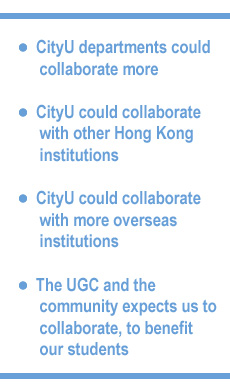Deep collaboration begins at home
Dear Colleagues,
Our new role statement, given to us by the University Grants Committee (UGC) in early January, states unequivocally that CityU "actively pursues deep collaboration in its areas of strength with other higher education institutions in Hong Kong, or the region, or more widely."Let me offer you my initial thoughts on what "deep collaboration" could mean.
I believe deep collaboration should start at home. There is still plenty of room within CityU for departments and faculties to cooperate on courses and programmes, and to pool their resources. Often, departments seem to offer courses designed more to conserve or increase their resources than to give students the best possible options. Frankly, we are only here because of the students. Therefore, whatever we do, we should not shortchange their education. Moreover, if we do not use our resources in the most effective way to offer them an excellent learning experience, we have done the community a disservice.
In launching a new collection of Role Statements for the local universities, the UGC has proposed to set aside 10% of 2005-08 funding to reward role-specific performances. It will also provide additional money to support initiatives that can demonstrate value in deep collaboration. I would consider proposing, to the Budget Committee, similar incentives to encourage collaboration among our departments and faculties.Locally, we need to consider working with institutions that have a high degree of complementariness with us. Without verifying my thoughts with those concerned, I can think of at least four institutions with which we should share courses, collaborate on research programmes and/or save on administrative costs. One: the most obvious, located next to us—the Baptist University. Our students can benefit from its existing repertoire of history, art, philosophy and literature courses. In return, their students could enroll in our courses in law, science and engineering, and creative media. Two: the Hong Kong Polytechnic University, because our backgrounds are similar and we both excel in professional education and applied research. While our respective strengths are somewhat different, we have identical role statements. Three: the Hong Kong University of Science and Technology, with which we share some academic strengths; if we joined forces in teaching and research, and share resources, it would benefit all involved. Four: the Hong Kong Academy of Performing Arts, where our School of Creative Media students could benefit from their courses in performing, and film-making, among others. Their students could take advantage of our strengths in technology and IT education. I believe these institutions, located near each other, enjoy a high degree of complementariness.
The UGC says that such endeavours are meant to contribute to the
I recently returned from a visit to three world-renowned European universities—the University of Paris I—La Sorbonne, with which CityU now has a new student exchange agreement; the Imperial College of London and the Catholic University of Leuven in Belgium, with which we have begun to explore research opportunities. It is my desire to establish ties with universities of growing stature in less popular destinations. Last year, during the Chinese New Year holidays, I went to India where its institutes of technology have become an important breeding ground of engineers and IT innovators.
This year, after my trip to Europe, I stopped over in Turkey and visited Istanbul's Bogazici (Bosphorus) University, which has a strong reputation in engineering and business. I had a very good talk with its Deputy Rector (Academic Affairs) and we agreed, in principle, to explore academic exchange for students and faculty. To support Hong Kong in becoming a world city, we should have exchanges with as many universities as possible outside the traditional sphere.
Clearly, 2004, the Year of Monkey will push us onwards and outwards. Deep collaboration is part of UGC and Community expectations of us. We should seize the opportunity and work diligently for the ongoing development of CityU.
H K Chang
President and University Professor


